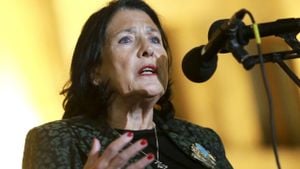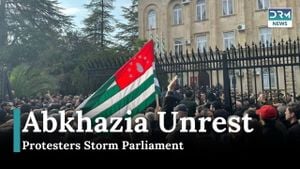Across the embattled Lebanon-Israel border, tensions reached unprecedented heights as hostilities resumed between Israeli forces and Hezbollah militants. The latest escalation, which began on October 1, 2023, has resulted in extreme casualties and deepened calls for ceasefire negotiations. The Israeli military announced its most significant ground incursion since the conflict reignited, seizing strategic territory within Lebanese borders.
On November 16, Israeli ground units reportedly advanced deep within Lebanon, capturing the village of Chamaa, located just three miles from the border. Reports from Lebanese media indicated Israel's forces temporarily occupied hilltops but faced fierce resistance from Hezbollah fighters. The confrontation led to the destruction of significant sites, including the Shrine of Shimon the Prophet, though Israeli forces declined to comment on specifics of the operations.
Simultaneously, the situation intensified as airstrikes targeted areas across Southern Lebanon, including the predominantly Hezbollah-held suburb of Dahiyeh. Reports from the Lebanese Health Ministry indicated the strikes as contributing to over 3,300 deaths and 14,400 injuries since late September alone. Among the casualties were numerous civilians, including children, raising alarms about international humanitarian efforts.
Hezbollah retaliated with numerous rocket and drone strikes aimed at Israeli military bases, marking its strongest military response to date. They claimed responsibility for 31 operations against Israel, targeting key military installations and troop formations, which underscored the deepening conflict. The Israeli military described the Hezbollah assaults as significant, reporting dozens of projectiles launched at northern Israeli settlements.
Both parties have signified openness to ceasefire talks, yet the negotiations remain heavily complicated. Lebanese Parliament Speaker Nabih Berri confirmed receipt of the U.S.'s ceasefire proposal, which is rooted deeply in the 2006 U.N. Security Council Resolution 1701. This resolution demands the disarmament of non-state military groups, allowing only Lebanese Armed Forces and U.N. peacekeepers to maintain security along the Lebanon-Israel border.
Critically, Prime Minister Najib Mikati of Lebanon has urged Iran, as Hezbollah's primary backer, to facilitate dialogue for peace. His discussions with Iranian officials reflect both urgency and recognition of the regional tensions affecting Lebanon’s stability. Iran’s Ali Larijani, following meetings with Mikati and Berri, pledged support for Lebanese sovereignty but maintained Iran’s commitment to support Hezbollah's military options as well.
The broader geopolitical ramifications of this conflict have ignited protests and diplomatic efforts globally. Inside Israel and Lebanon, citizens have taken to the streets, calling for peace and questioning their governments' handling of the crises. Israeli civilians, particularly those near the border, have demanded increased protection and assertive military actions against Hezbollah.
Meanwhile, the U.S. has actively sought to mediate the ceasefire situation. Ambassador to Lebanon Lisa Johnson has traveled to engage with local leaders, emphasizing the long-term need for both immediate cessation of hostilities and the enforcement of resolutions enabling peace in the region.
Yet, the proposed ceasefire remains contentious among Lebanese officials, especially the stipulation advocating for the unconditional withdrawal of Israeli forces within seven days. Speaker Berri has denounced any proposal hinting at permitting Israeli military access to Lebanese territory, insisting on behalf of the Lebanese government their sovereignty must remain intact and unbreached.
Internationally, nations have rushed to respond as humanitarian concerns grow. The U.N. Security Council is considering pressing for immediate cease-fire resolutions, yet the effective implementation relies heavily on the political leverage held by the U.S. and its relationship with Israel, creating additional layers of difficulty.
Back at home, the conflict raised questions about internal politics within Lebanon. Critics of Iranian influence argue for stronger national unity and decision-making free from external pressures. Mikati's appeal signifies this growing urgency. The local sentiment tends to view Iranian backing as both protective and potentially harmful, depending on how militarily assertive Hezbollah chooses to be.
The gravity of the situation escalated as both sides traded fire over the weekend, resulting in losses on both fronts. Israeli forces reported one soldier killed, and continued operational activity has heightened fears among civilians trapped between the fighting factions.
With calls for peaceful resolutions echoed among the global community, the road to lasting peace remains fraught. Both Hezbollah and Israeli officials navigate complex emotions of nationalist pride and survival, prompting questions about what future may lie for the people caught within the crossfire of their most recent conflict.
Despite the agony inflicted, paired with political maneuvering both across the Mediterranean and within the corridors of power, the conflict continues to grip the region with no clear end. The need for diplomatic discussions looms large even as each day transforms the region's complicated narrative of warfare.
This fragile dance of military action, political appeals, and societal outcry encapsulates the heated strife between Lebanon and Israel, signaling the need for comprehensive responses as communities grapple with their dire sacrifices.



